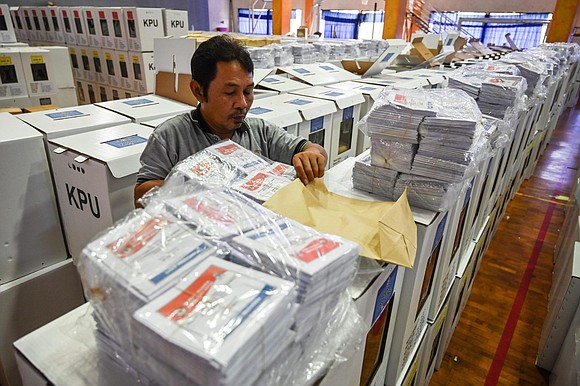More than 300 workers dead after Indonesian election
CNN/Stylemagazine.com Newswire | 4/29/2019, 12:49 p.m.

By Devianti Faridz, Julia Hollingsworth and Tara John, CNN
(CNN) -- More than 300 Indonesian election workers have died, many of which from fatigue-related illnesses, after the world's third biggest democracy hit the polls earlier this month.
On April 17, Indonesia held its presidential and legislative elections, with around 192.8 million people across the archipelago's 17,000 islands eligible to vote in more than 800,000 polling stations.
An estimated six million election workers were involved in the election, which was billed as one of the most complicated single-day ballots ever undertaken.
As of Monday, 311 election officials have died and another 2,232 people have fallen sick after helping to administer the election, according to figures from the National Elections Commission (KPU).
Evi Novida Ginting, a KPU commissioner, told CNN the deaths were mostly caused by exhaustion and heart attacks. She described election workers as "dedicated and devoted," but "sadly at the cost of neglecting their own physical health."
"The number of deaths during this year's general elections came as a surprise to us. There were work-related deaths during the previous elections, but not this many," Ginting told CNN.
KPU's Commissioner Ilham Saputra appeared to acknowledge that elections officers had been overworked during the process.
"Since the presidential and legislative elections were combined, our polling station officials not only had to endure physical challenges but also mental pressure," Saputra told CNN.
"One day before, they prepared all the needed logistics, set up the tent and ensured that the election invitations were delivered," he said.
"It almost seemed like they didn't have much time to rest because at 7am (8pm ET) the following morning they needed to return to the polling stations to count all the ballot cards and open the polling stations to the public."
He hopes a study, proposed by medical students at the University of Indonesia, will help pinpoint the exact reason behind the deaths. "Was it mostly caused by the immense workload or was it the mental pressure that led to their deaths?" he said.
'Too overwhelmed with the workload'
One of victims was 53-year-old polling station official Anwari, from the North Duri district in West Jakarta.
His responsibilities included checking the condition of each ballot, folding hundreds of ballot cards, and hand delivering voting invitations to people in the local area -- a task which lasted from early morning until the evening.
Anwari's daughter, Anna Karlina, 30, told CNN that her father began preparing for the elections three days in advance of the April 17 vote.
Her father had a history of heart problems, and began to feel chills and shortness of breath in the days leading to the election.
"On Election Day, he went home to take a break and I asked him why he walked home barefoot," she added. He said one of his feet, which appeared swollen, felt numb.
Ten days after the vote, Anwari was admitted to a hospital. By Monday morning, he had died.
His daughter describes the long workdays and stress as bruising for election workers like Anwari. "People simply were too overwhelmed with the workload," she said.
Overworked
Sandiaga Uno, the running mate of presidential candidate Prabowo Subianto, told CNN Indonesia that fundamental mistakes had been made in how the election was implemented.
"If the victims continue to fall, there is something fundamentally very wrong," he said, according to CNN Indonesia.
Final official results will be announced by May 22. However, early results indicated that incumbent Indonesian President Joko "Jokowi" Widodo had secured a second term, winning the presidency for a second time against longtime rival Prabowo. Prabowo initially claimed that alternative polls by his own team put him in the lead.
Early "quick counts" of the ballots put Jokowi around 55% of the vote, with Prabowo winning around 44%. "Quick counts" are conducted by a variety of credible polling agencies and have proved reliable in the past.



